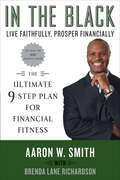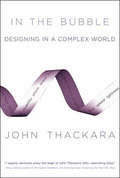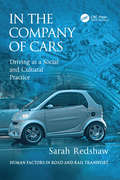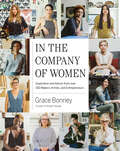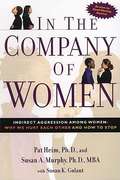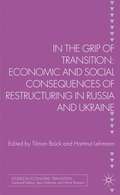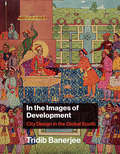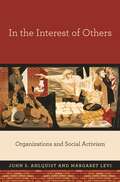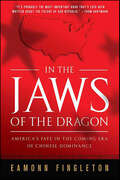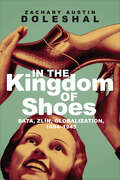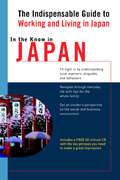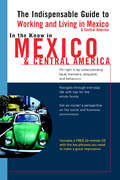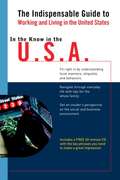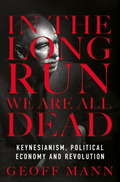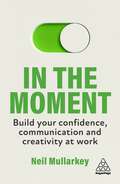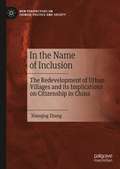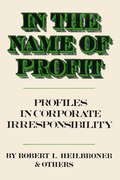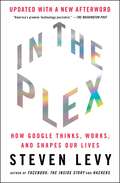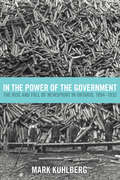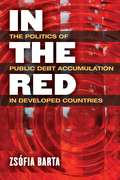- Table View
- List View
In the Black: Live Faithfully, Prosper Financially
by Aaron W. Smith Brenda Lane RichardsonWith economic uncertainty reaching unprecedented levels, Aaron W. Smith's accessible nine-step plan to take control of your financial future will resonate whether you're just starting out or finding yourself midlife with concerns about your retirement. In The Black will transform your retirement plans, regardless of income, by offering concrete advice on what opportunities are available and using real-life examples to illustrate how anyone can achieve their financial dreams be they middle- aged and facing debt or actively saving since their early twenties. In clear, easy-to-follow steps, readers will learn how to:Overcome historical resistance to investingSave for retirement while keeping kinship ties intactUse faith as a motivator for saving and strengthening financial disciplineBreak through denial about changes in Social Security and pension plans. . . and much more.
In the Bubble: Designing in a Complex World
by John ThackaraHow to design a world in which we rely less on stuff, and more on people. We're filling up the world with technology and devices, but we've lost sight of an important question: What is this stuff for? What value does it add to our lives? So asks author John Thackara in his new book, In the Bubble: Designing for a Complex World. These are tough questions for the pushers of technology to answer. Our economic system is centered on technology, so it would be no small matter if "tech" ceased to be an end-in-itself in our daily lives. Technology is not going to go away, but the time to discuss the end it will serve is before we deploy it, not after. We need to ask what purpose will be served by the broadband communications, smart materials, wearable computing, and connected appliances that we're unleashing upon the world. We need to ask what impact all this stuff will have on our daily lives. Who will look after it, and how?In the Bubble is about a world based less on stuff and more on people. Thackara describes a transformation that is taking place now—not in a remote science fiction future; it's not about, as he puts it, "the schlock of the new" but about radical innovation already emerging in daily life. We are regaining respect for what people can do that technology can't. In the Bubble describes services designed to help people carry out daily activities in new ways. Many of these services involve technology—ranging from body implants to wide-bodied jets. But objects and systems play a supporting role in a people-centered world. The design focus is on services, not things. And new principles—above all, lightness—inform the way these services are designed and used. At the heart of In the Bubble is a belief, informed by a wealth of real-world examples, that ethics and responsibility can inform design decisions without impeding social and technical innovation.
In the Company of Cars: Driving as a Social and Cultural Practice (Human Factors in Road and Rail Transport)
by Sarah RedshawIt has long been accepted that the social and cultural meanings of the car far exceed the practical need for mobility. This book marks the first attempt to contribute to road safety, considering, in depth, these meanings and the cultures of driving that are shaped by them. In the Company of Cars examines the perspectives that young people have on cars, and explores the broader social and cultural meanings of the car, the potential it is supposed to fulfil, and the anticipated benefits it offers to young drivers. From focus-group research conducted in Australia, the book takes up the views of young people on a range of topics, from media to car use to gender performance. The author looks at the ways in which driving has been defined by articulations of the car that emphasize valued features of the car-driver, such as gender, youthfulness, status, age, power, raciness, sexiness, ruggedness and competitiveness. The book takes a global perspective on mobility, considering the impact of cars and road safety policy on quality of life, and the value and significance of other modes of travel, in a range of countries.
In the Company of Women: Inspiration and Advice from over 100 Makers, Artists, and Entrepreneurs
by Grace BonneyNew York Times Bestseller “I want to rip out every page of this glorious book and hang them on my wall so that I can be surrounded by these incredible women all day long.” —Emma Straub, New York Times bestselling author of The Vacationers and Modern Lovers Over 100 exceptional and influential women describe how they embraced their creative spirit, overcame adversity, and sparked a global movement of entrepreneurship. Media titans and ceramicists, hoteliers and tattoo artists, comedians and architects—taken together, these profiles paint a beautiful picture of what happens when we pursue our passions and dreams.
In the Company of Women
by Pat HeimTwo leading experts on gender issues in the workplace describe how indirect aggression among women undermines their professional and personal success, and explain how to change conflict into cooperation. Following the success of Queen Bees and Wannabes and Odd Girl Out, about aggression in girls, In the Company of Womenexplains how indirect, or "relational," aggression can hurt women and hinder them from achieving success and harmony in their adult lives. Gender studies have shown that when a goal is in sight, men generally use direct action to attain it. Women, on the other hand, have been socialized to express aggressive actions through indirect means-using behavior such as shunning, stigmatizing, and gossiping to emotionally cripple those standing in the way of the achievement they seek. With startling insights into the meaning of our everyday behavior, this book offers straightforward techniques to change conflict among women into cooperation by resolving discords peaceably, building relationships, and making the most of women's unique leadership and communication skills.
In the Eye of the Storm: What's Going on Inside the Brain When Good Leaders Make Bad Decisions?
by Jo Whitehead Sydney Finkelstein Andrew CampbellHurricane Katrina caused catastrophic damage to the Gulf Coast in August of 2005. Hundreds of thousands of people lost their homes--many permanently. At least 1,800 people died, and the total cost of the damage was estimated at $86 billion. And yet, many hours were lost as Matthew Broderick, Director of the Homeland Security Operations Center in Washington, D.C., gathered information and then made the wrong decision, failing to leap into action in time to avert disaster. Good leaders make bad decisions. Indeed, the daunting reality is that enormously important decisions made by intelligent, responsible people with the best information and intentions sometimes go wrong. But why? In this chapter, the authors explain why to answer this question, we need to understand what goes on inside the brain when an individual is faced with a tough decision. This chapter was originally published as chapter 1 of "Think Again: Why Good Leaders Make Bad Decisions and How to Keep It From Happening to You."
In the Footsteps of Darwin: Geoheritage, Geotourism and Conservation in the Galapagos Islands (Geoheritage, Geoparks and Geotourism)
by Daniel Kelley Kevin Page Diego Quiroga Raul SalazarThis book provides the first-ever overview of and guide to the geological setting and related features of the famous, volcanically active Galapagos Islands, as well as an in-depth analysis of the setting’s relationship to the region’s unique and iconic ecology, and its conservation. Further, it provides an introduction to human settlement and activity on the islands, including the transition from subsistence to a fishing economy and more recently tourism, all in the context of increasingly restrictive conservation regulations. Importantly, the book also explores the development of the concept and practice of sustainable development across the islands as a framework for future economic development, pursuing an approach that reconciles the needs of the resident population with conservation of this fragile environment.The book is intended for a broad readership, from those engaged in geological and ecological studies, college and university educators and conservation practitioners, to more general visitors to the islands.
In the Footsteps of Giorgio Philip Szegö: His Scientific Contributions, Life, and Legacy (International Series in Operations Research & Management Science #346)
by Rita Laura D’Ecclesia Rosella Castellano Giovanni M. ZambrunoThis book offers essential information on the life and career of the recently deceased Giorgio P. Szegö, particularly his important contributions in various areas of mathematical programming and applications to financial markets. It highlights the developments in the fields of stability theory and dynamical systems brought about by his work in the early 1960s and 1970s, then moves on to address his valuable contributions to portfolio theory in the late 1970s and early 1980s, and, finally, examines his work in the field of risk management and the role of financial regulation in the late 1990s. The book explores Giorgio P. Szegö’s contributions in diverse research areas ranging from global optimization, theory of stability and dynamical systems to applications of financial mathematics to portfolio theory, risk measurement and financial regulation. It also covers his consulting work for such major international institutions as the IMF, World Bank and OECD.
In the Grip of Transition: Economic and Social Consequences of Restructuring in Russia and Ukraine
by Tilman Bruck Hartmut LehmannThe shift from a centrally planned to a market-based economy involves, amongst other elements, the restructuring of state-owned or privatized enterprises. Realigning product lines, adopting new technology and imposing sound finances are all important stages in the integration of enterprises into world markets. This book analyses the efficiency and equity of the economic restructuring in the two largest successor states of the Soviet Union, Russia and Ukraine. It raises important questions such as why these countries have been relatively slow to pursue restructuring policies, how the transition has affected labour markets and institutions, and how it impacted on poverty and social safety. The analysis is based on a careful examination of micro-level data, documenting the experiences of and interactions between individuals and institutions.
In the Images of Development: City Design in the Global South (Urban and Industrial Environments)
by Tridib BanerjeeThe urban legacy of the Global South since the colonial era and how sustainable development and environmental and social justice can be achieved. Remarkably little of the expansive literature on development and globalization considers actual urban form and the physical design of cities as outcomes of these phenomena. The development that has shaped historic transformations in urban form and urbanism—and the consequent human experiences—remains largely unexplored. In this book, Tridib Banerjee fills this void by linking the idea of development with those of urbanism, urban form, and urban design, focusing primarily on the contemporary cities in the developing world—the Global South—and their intrinsic prospects in city design. Further, he examines the endogenous possibilities for the future design of these cities that may address growing inequality and the environmental crisis. Banerjee deftly traces the urban legacy of the Global South from the beginning of the colonial era, closely examining the economic, political, and ideological forces that influenced colonial and postcolonial development, drawing from relevant experiences of different cities in the developing world and discussing the arguments for the historic parity of these cities with their Western counterparts. Finally, Banerjee considers essential notions of future city design that are grounded in the critical challenges of sustainable development, equity, environmental and social justice, and diversity, and how such outcomes can be achieved. This book serves as the opening of a long overdue conversation among design, development, and planning scholars and practitioners, and those interested in the urban development of the Global South.
In the Interest of Others: Organizations and Social Activism
by John S. Ahlquist Margaret LeviA groundbreaking study of labor unions that advances a new theory of organizational leadership and governanceIn the Interest of Others develops a new theory of organizational leadership and governance to explain why some organizations expand their scope of action in ways that do not benefit their members directly. John Ahlquist and Margaret Levi document eighty years of such activism by the International Longshore and Warehouse Union in the United States and the Waterside Workers Federation in Australia. They systematically compare the ILWU and WWF to the Teamsters and the International Longshoremen's Association, two American transport industry labor unions that actively discouraged the pursuit of political causes unrelated to their own economic interests.Drawing on a wealth of original data, Ahlquist and Levi show how activist organizations can profoundly transform the views of members about their political efficacy and the collective actions they are willing to contemplate. They find that leaders who ask for support of projects without obvious material benefits must first demonstrate their ability to deliver the goods and services members expect. These leaders must also build governance institutions that coordinate expectations about their objectives and the behavior of members.In the Interest of Others reveals how activist labor unions expand the community of fate and provoke preferences that transcend the private interests of individual members. Ahlquist and Levi then extend this logic to other membership organizations, including religious groups, political parties, and the state itself.
In the Jaws of the Dragon: America's Fate in the Coming Era of Chinese Dominance
by Eamonn FingletonIn recent years, popular wisdom has held that opening American markets to Chinese goods was the best way to promote democracy in Beijing---that the Communist Party's grip would quickly weaken as increasingly affluent Chinese citizens embraced American values. That popular wisdom was wrong. As Eamonn Fingleton shows in this devastating book, instead of America changing China, China is changing America. Although this process of reverse convergence has been swept largely under the carpet by knee-jerk globalists in the American press, Americans will soon be hearing much more about it. Nowhere is the pattern more obvious than in business. Many top American corporations---Boeing, AT&T, the Detroit automobile companies, among them-openly collaborate with the Chinese Communist Party. In a stunning rejection of Western values, Yahoo! even provided the Chinese secret police with vital evidence that resulted in a ten-year jail sentence for one of its Chinese subscribers, a brave young dissident, under draconian censorship laws. Selling the American national interest short, countless other corporations abjectly do Beijing's lobbying in Congress. This book---the culmination of twenty years of study---also breaks new ground by revealing the secret behind China's phenomenal savings rate. Top leaders literally force the Chinese people to save through a highly counterintuitive---and, to ordinary citizens, virtually invisible---policy called suppressed consumption. This practice, which is to economics roughly what steroids are to sport, is fundamentally incompatible with Western ideas of fair global competition. It is reinforced by an Orwellian system of political control that, as Fingleton reveals, utilizes an ancient bureaucratic tool called selective enforcement---a form of blackmail that instills a silent reign of terror throughout Chinese society. Most worryingly, selective enforcement can readily be unleashed on any American corporation with interests in China---which is to say just about every member of the Fortune 500. While the Chinese people's rising affluence is, of course, an occasion for wholehearted rejoicing, Uncle Sam should give the Chinese power system a wide berth---lest he catch his coattails in the jaws of a dragon.
In the Kingdom of Shoes: Bata, Zlín, Globalization, 1894–1945
by Zachary Austin DoleshalOne of the world’s largest sellers of footwear, the Bata Company of Zlín, Moravia has a remarkable history that touches on crucial aspects of what made the world modern. In the twilight of the Habsburg Empire, the company Americanized its production model while also trying to Americanize its workforce. It promised a technocratic form of governance in the chaos of postwar Czechoslovakia, and during the Roaring Twenties, it became synonymous with rationalization across Europe and thus a flashpoint for a continent-wide debate. While other companies contracted in response to the Great Depression, Bata did the opposite, becoming the first shoe company to unlock the potential of globalization. As Bata expanded worldwide, it became an example of corporate national indifference, where company personnel were trained to be able to slip into and out of national identifications with ease. Such indifference, however, was seriously challenged by the geopolitical crisis of the 1930s, and by the cusp of the Second World War, Bata management had turned nationalist, even fascist. In the Kingdom of Shoes unravels the way the Bata project swept away tradition and enmeshed the lives of thousands of people around the world in the industrial production of shoes. Using a rich array of archival materials from two continents, the book answers how Bata’s rise to the world’s largest producer of shoes challenged the nation-state, democracy, and Americanization.
In the Know in Japan
by Jennifer PhillipsBe IN THE KNOW BEFORE YOU GO Doing business across borders is very different from doing business across town-subtle and not-so-subtle differences in attitudes and etiquette play a big role. Did you know? * Bowing in Japan isn't just bending at the waist; where you put your hands and how deep you bow makes a big difference! * Don't give gifts in groups of four or nine. "Four" and "nine" are unlucky because the words sound like "death" and "hardship" in Japanese. * Don't expect Japanese colleagues to come out and say "no." They will usually say "maybe." In the Know in Japan helps you: * Fit right in by understanding local manners, etiquette, and behaviors * Navigate through everyday life with tips for the whole family * Get an insider's perspective on the social and business environment The book includes a FREE 60-minute CD with the key phrases you need to make a great impression.From the Package edition.
In the Know in Mexico and Central America
by Jennifer PhillipsSuccess abroad--in doing business, socializing, or even just getting to appointments--depends on much more than memorizing a few survival expressions in the language. Just ask anyone who's stowed a Chinese colleague's business card in his or her back pocket or brought an even number of flowers to a German friend's home. Success abroad means being in the know about cultural differences, andIn the Know Mexico & Central Americacross-cultural guide makes it simple for business people and their families to adapt successfully to their new surroundings, whether it's for a long-term relocation or just for a short business trip. More than just a list of do's and don'ts,In the Know Mexico & Central America. . . provides a through understanding of Mexican and central American culture--what motivates people's behaviors, attitudes, beliefs and habits. supplies essential background information on Mexico and Central America meets the needs of everyone, including the businessperson, the stay-at-home or working partner, children, teens, and singles focuses on business environment, company structure, work attire, women in business, meetings, communication, and more includes and audio CD to help the reader master basic social expressions and make a lasting impression Includes a 288-page handbook and a 60-minute audio CD
In the Know in the U.S.A.
by Jennifer PhillipsIN THE KNOW IN THE U. S. A. is the essential guide for foreign executives and their families relocating to the United States,businesspeople who make short trips to the U. S. , and anyone who works closely with Americans. The book begins with an OVERVIEW OF AMERICAN HISTORY AND CULTURE to give the reader a fundamental understanding ofthe United States and its people. It presents the most important differences between American and other cultures, including concepts oftime, group dynamics, reasoning styles, communication, and status & hierarchy. For example, even though Americans are fond of saying,"Oh, just drop by any time," they usually DON'T mean it-for those planning to visit a friend, call first to schedule a visit. Newcomerswill also find out that Americans often begin conversations with a compliment-they compliment each other as a way of being friendly andshowing an interest in someone. Foreigners often get the impression that they have the world's best wardrobe, because virtually everythingthey wear receives a compliment!There are also SECTIONS ON EVERYDAY LIFE in the United States, including getting around, going shopping, finding housing,socializing and adjusting to the culture. Important issues such as parenting abroad, impact on children, the non-working partner, dual-career couples, the single life, race, and gender are covered. The BUSINESS SECTIONS deal with etiquette in the workplace, meetings,negotiations, corporate hierarchy, business communication styles, and women in business. Attached to the back cover is a FREE 60-MINUTE AUDIO CD that features business vocabulary, business idiomatic expressions,computer terminology and other survival phrases-just the right amoung of English to enrich the reader's experience in the United Statesand demonstrate to his or her host the amount of effort he or she has put into understanding American culture.
In the Light of Humane Nature: Human Values, Nature, the Green Economy, and Environmental Salvation
by Arthur B. WeissmanThis engaging book encourages us to tap into humanity&’s highest ideals to solve environmental and social problems and become better people in the process. Despite significant progress in recent decades, the environmental crisis is far from over. We know what needs to change, but we don&’t seem to know—economically, politically, or socially—how to stop the juggernaut of destructive development and resource depletion. Something continues to undermine our efforts to become a truly sustainable society. This book highlights the positive accomplishments we have made recently in greening the economy, but also exposes the underlying causes of our continued march toward disaster. A seasoned environmental professional, Arthur Weissman argues that what causes our environmental problems and stymies solutions ultimately relates to human values and our attitudes toward the world around us, including other humans, other species, and nature as a whole. We will attain our true relationship with nature only when we embrace the highest human values. In the Light of Humane Nature weaves personal narrative and autobiographical details with professional and philosophical discourse. Weissman sticks to essential concepts we can all comprehend, and presents the changes we need to make in our moral and aesthetic outlooks to connect with our highest human values so that we may achieve a sustainable and humane world.
In the Long Run We Are All Dead
by Geoff MannA groundbreaking debunking of moderate attempts to resolve financial crisesIn the ruins of the 2007–2008 financial crisis, self-proclaimed progressives the world over clamoured to resurrect the economic theory of John Maynard Keynes. The crisis seemed to expose the disaster of small-state, free-market liberalization and deregulation. Keynesian political economy, in contrast, could put the state back at the heart of the economy and arm it with the knowledge needed to rescue us. But what it was supposed to rescue us from was not so clear. Was it the end of capitalism or the end of the world? For Keynesianism, the answer is both. Keynesians are not and never have been out to save capitalism, but rather to save civilization from itself. It is political economy, they promise, for the world in which we actually live: a world in which prices are ‘sticky’, information is ‘asymmetrical’, and uncertainty inescapable. In this world, things will definitely not take care of themselves in the long run. Poverty is ineradicable, markets fail, and revolutions lead to tyranny. Keynesianism is thus modern liberalism's most persuasive internal critique, meeting two centuries of crisis with a proposal for capital without capitalism and revolution without revolutionaries. If our current crises have renewed Keynesianism for so many, it is less because the present is worth saving, than because the future seems out of control. In that situation, Keynesianism is a perfect fit: a faith for the faithless.From the Hardcover edition.
In the Moment: Build Your Confidence, Communication and Creativity at Work
by Neil MullarkeyThere are moments throughout our lives when our confidence and creativity can make all the difference. Discover how to transform your career and grow your network by finding success In The Moment.Every meeting, presentation and conversation is an opportunity to embrace your confidence and show your creative flair. With insights on collaboration, risk-taking and organization, this book arms you with a complete repertoire of powerful communication tricks and strategies. As both a communication expert and a renowned comedian, Neil Mullarkey is uniquely qualified to demonstrate how you can develop your creativity, communication and confidence in your professional life. With incisive case studies and witty observations, In the Moment is an engaging and illuminating guide to success.
In the Name of Democracy? The Rise and Decline of India's Congress Party
by Jonathan Schlefer Akshay ManglaIn 1950 it looked highly doubtful that Indian democracy would hold -- typical family income was $6 a month, only about 15 percent of the population was literate, there were deep religious and ethnic differences, and more than a dozen national languages were spoken. But after a half a century, India had proved to be the first democracy anywhere near so poor to survive. Why? As well, in 1950 India's economic prospects looked bright for a developing country -- it had a well trained government bureaucracy bequeathed by the British, a secure legal system, national railroads, and more advanced industry than, for example, China. Why did the economy do so poorly?
In the Name of Inclusion: The Redevelopment of Urban Villages and its Implications on Citizenship in China (New Perspectives on Chinese Politics and Society)
by Xiaoqing ZhangThis book follows the citizenship-based approach and interrogates the policies on urban village redevelopment from a perspective of social exclusion and inclusion. It focuses on two questions: how policy makers and urban villagers understand social inclusion differently, and what makes a difference in enhancing social inclusion. Firstly, an examination of citizenship conceptions, as reflected in the Chinese traditional discourses, provides the basis for questioning the political rhetoric of social inclusion in China. Secondly, a comparison between policy makers’ and villages’ interpretations on urban citizenship helps explore the different understandings of citizenship between them. Finally, by studying six redeveloped urban villages in the city of Xi’an, the book identifies what villagers strive for, and discusses how their strivings make a difference in achieving social inclusion during urban village redevelopment.
In the Name of Profit
by Robert L. HeilbronerSaid One Executive: "Why should my conscience bother me?"Here are dramatic true stories of executives whose desire for profit leads them into shameful decisions. Naming actual executive of major American companies, the authors portray corporate irresponsibility in human term. One executive is shown as he orders his subordinates to fake a lab report, even though the result might be loss of life. Others are shown as they bribe a city official, as they knowingly sell a dangerous drug, as they enrich themselves by betraying their stockholders. These men are not the familiar fast-buck artists, the petty cheats who can be dismissed as "bad apples." The authors reveal themselves as solid citizens, educated and well-respected. Yet in the course of business they easily yield to ambition, avarice or the corporate culture. And almost always, after they are exposed, they are promoted by their companies.Together these profiles, all of them written especially for this book, give life to questions raised by books such as America, Inc. and The Greening of America:· What kind of men run some super-corporations?· How can "good men" behave so badly"· Does working for a corporation mean violating one's conscience? After all the stories are told, the brilliant economist and social critic Robert L. Heilbroner offers a chapter of perspective. First he confronts the various positions on corporate responsibility--at one extreme, breaking up the big corporations; at the other, leaving executive entirely free to maximize profits. And then he cuts through to the realities if the matter, showing us where the best chance of remedy lies.
In the Plex: How Google Thinks, Works, and Shapes Our Lives
by Steven Levy&“The most interesting book ever written about Google&” (The Washington Post) delivers the inside story behind the most successful and admired technology company of our time, now updated with a new Afterword.Google is arguably the most important company in the world today, with such pervasive influence that its name is a verb. The company founded by two Stanford graduate students—Larry Page and Sergey Brin—has become a tech giant known the world over. Since starting with its search engine, Google has moved into mobile phones, computer operating systems, power utilities, self-driving cars, all while remaining the most powerful company in the advertising business. Granted unprecedented access to the company, Levy disclosed that the key to Google&’s success in all these businesses lay in its engineering mindset and adoption of certain internet values such as speed, openness, experimentation, and risk-taking. Levy discloses details behind Google&’s relationship with China, including how Brin disagreed with his colleagues on the China strategy—and why its social networking initiative failed; the first time Google tried chasing a successful competitor. He examines Google&’s rocky relationship with government regulators, particularly in the EU, and how it has responded when employees left the company for smaller, nimbler start-ups. In the Plex is the &“most authoritative…and in many ways the most entertaining&” (James Gleick, The New York Book Review) account of Google to date and offers &“an instructive primer on how the minds behind the world&’s most influential internet company function&” (Richard Waters, The Wall Street Journal).
In the Power of the Government
by Mark KuhlbergFor forty years, historians have argued that early twentieth-century provincial governments in Canada were easily manipulated by the industrialists who developed Canada's natural resources, such as pulpwood, water power, and minerals. With In the Power of the Government, Mark Kuhlberg uses the case of the Ontario pulp and paper industry to challenge that interpretation of Canadian provincial politics.Examining the relationship between the corporations which ran the province's pulp and paper mills and the politicians at Queen's Park, Kuhlberg concludes that the Ontario government frequently rebuffed the demands of the industrialists who wanted to tap Ontario's spruce timber and hydro-electric potential. A sophisticated empirical challenge to the orthodox literature on this issue, In the Power of the Government will be essential reading for historians and political scientists interested in the history of Canadian industrial development.
In the Red: The Politics of Public Debt Accumulation in Developed Countries
by Zsófia BartaWhy do rich countries flirt with fiscal disaster? Between the 1970s and the 2000s, during times of peace and prosperity, affluent countries—like Belgium, Greece, Italy, and Japan—accumulated so much debt that they became vulnerable and exposed themselves to the risk of default. In the past three decades, an extensive scholarly consensus emerged that these problems were created by fiscal indiscipline, the lack of sufficient concern for budgetary constraints from policy makers as they try to please voters. This approach formed the foundation for the fiscal surveillance system that attempted to bring borrowing in European countries under control via a set of fiscal rules. In the Red demonstrates that the problem of sustained, large-scale debt accumulation is an adjustment issue rather than a governance failure. Irrespective of whether the original impetus for borrowing arose from exogenous changes or irresponsible decision making, policy makers invariably initiate spending cuts and/or tax increases when debt grows at an alarming rate for several years in a row. Zsófia Barta argues that explaining why some countries accumulate substantial amounts of debt for decades hinges on understanding the conditions required to allow policy makers to successfully put into place painful adjustment measures.
